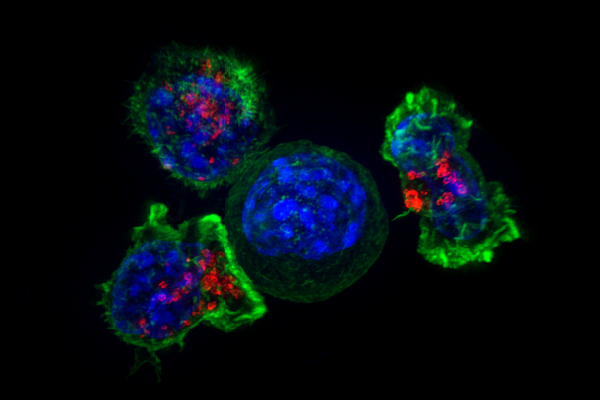Immune therapy scientists discover distinct cells that block cancer-fighting immune cells

Princess Margaret Cancer Centre scientists have discovered a distinct cell population in tumours that inhibits the body's immune response to fight cancer.
The findings, published online today in Nature Medicine, are critical to understanding more about why patients do or do not respond to immune therapies, says principal investigator Pamela Ohashi, Director, Tumour Immunotherapy Program at the cancer centre, University Health Network. Dr. Ohashi holds a Canada Research Chair in Autoimmunity and Tumour Immunity. She is also a Professor at University of Toronto in the Departments of Medical Biophysics and Immunology.
"We've uncovered a potential new approach to modulate the immune response to cancer," says Dr. Ohashi. "By looking at tumour biology from this different perspective we'll have a better understanding of the barriers that prevent a strong immune response. This can help advance drug development to target these barriers."
The research team with international collaborators analysed more than 100 patient samples from ovarian and other cancer types to discover a distinct population of cells found in some tumours. This population of cells suppresses the growth of cancer-fighting immune cells, thereby limiting the ability of the immune system to fight off cancer.
For patients, down the road Dr. Ohashi envisions a new era of combined therapies to simultaneously target and kill these suppressive cells while augmenting the immune response against cancer. "This would really strengthen the way clinicians can treat cancer using immune therapy, which holds so much promise for patients."
The team's next avenue of research will be focused on identifying a "biomarker" that can identify this distinct suppressive cell elsewhere in the body - for example, in blood or other samples - as a potential predictive clinical tool to determine when these cells are present in patients, which currently cannot be done.
"That knowledge will guide clinical decisions to personalize cancer treatment to unleash an individual's immune response," says Dr. Ohashi. "We need to identify ways to track these cells and find another source and ways to grow these cells for further study."
More information: Sarah Q Crome et al, A distinct innate lymphoid cell population regulates tumor-associated T cells, Nature Medicine (2017). DOI: 10.1038/nm.4278
















